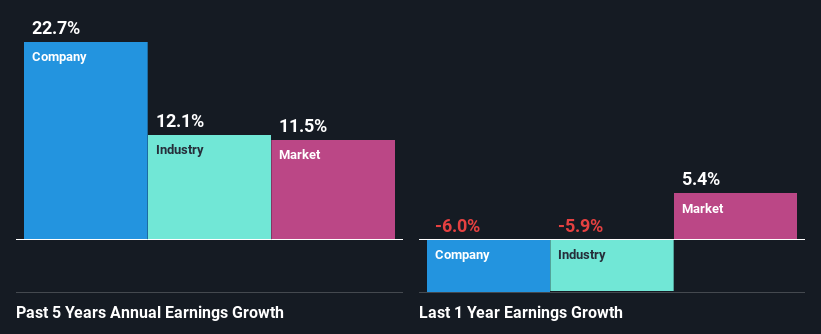Is Ingredion Incorporated's (NYSE:INGR) Recent Stock Performance Tethered To Its Strong Fundamentals?
Ingredion (NYSE:INGR) has had a great run on the share market with its stock up by a significant 11% over the last three months. Given the company's impressive performance, we decided to study its financial indicators more closely as a company's financial health over the long-term usually dictates market outcomes. In this article, we decided to focus on Ingredion's ROE.
Return on equity or ROE is a key measure used to assess how efficiently a company's management is utilizing the company's capital. In other words, it is a profitability ratio which measures the rate of return on the capital provided by the company's shareholders.
How Is ROE Calculated?
The formula for return on equity is:
Return on Equity = Net Profit (from continuing operations) ÷ Shareholders' Equity
So, based on the above formula, the ROE for Ingredion is:
16% = US$635m ÷ US$4.0b (Based on the trailing twelve months to March 2025).
The 'return' is the amount earned after tax over the last twelve months. One way to conceptualize this is that for each $1 of shareholders' capital it has, the company made $0.16 in profit.
View our latest analysis for Ingredion
What Has ROE Got To Do With Earnings Growth?
So far, we've learned that ROE is a measure of a company's profitability. We now need to evaluate how much profit the company reinvests or "retains" for future growth which then gives us an idea about the growth potential of the company. Assuming all else is equal, companies that have both a higher return on equity and higher profit retention are usually the ones that have a higher growth rate when compared to companies that don't have the same features.
Ingredion's Earnings Growth And 16% ROE
At first glance, Ingredion seems to have a decent ROE. Further, the company's ROE compares quite favorably to the industry average of 9.6%. Probably as a result of this, Ingredion was able to see an impressive net income growth of 23% over the last five years. We reckon that there could also be other factors at play here. For example, it is possible that the company's management has made some good strategic decisions, or that the company has a low payout ratio.
As a next step, we compared Ingredion's net income growth with the industry, and pleasingly, we found that the growth seen by the company is higher than the average industry growth of 12%.

Earnings growth is an important metric to consider when valuing a stock. What investors need to determine next is if the expected earnings growth, or the lack of it, is already built into the share price. By doing so, they will have an idea if the stock is headed into clear blue waters or if swampy waters await. Is INGR fairly valued? This infographic on the company's intrinsic value has everything you need to know.
Is Ingredion Using Its Retained Earnings Effectively?
The three-year median payout ratio for Ingredion is 33%, which is moderately low. The company is retaining the remaining 67%. By the looks of it, the dividend is well covered and Ingredion is reinvesting its profits efficiently as evidenced by its exceptional growth which we discussed above.
Besides, Ingredion has been paying dividends for at least ten years or more. This shows that the company is committed to sharing profits with its shareholders. Based on the latest analysts' estimates, we found that the company's future payout ratio over the next three years is expected to hold steady at 34%. Accordingly, forecasts suggest that Ingredion's future ROE will be 14% which is again, similar to the current ROE.
Conclusion
On the whole, we feel that Ingredion's performance has been quite good. In particular, it's great to see that the company is investing heavily into its business and along with a high rate of return, that has resulted in a sizeable growth in its earnings. With that said, the latest industry analyst forecasts reveal that the company's earnings growth is expected to slow down. To know more about the latest analysts predictions for the company, check out this visualization of analyst forecasts for the company.
Have feedback on this article? Concerned about the content? Get in touch with us directly. Alternatively, email editorial-team (at) simplywallst.com.
This article by Simply Wall St is general in nature. We provide commentary based on historical data and analyst forecasts only using an unbiased methodology and our articles are not intended to be financial advice. It does not constitute a recommendation to buy or sell any stock, and does not take account of your objectives, or your financial situation. We aim to bring you long-term focused analysis driven by fundamental data. Note that our analysis may not factor in the latest price-sensitive company announcements or qualitative material. Simply Wall St has no position in any stocks mentioned.
 Wall Street Journal
Wall Street Journal